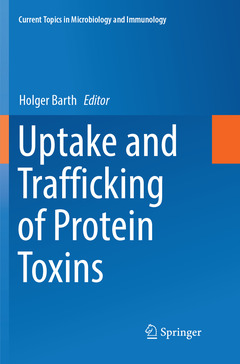Uptake and Trafficking of Protein Toxins, Softcover reprint of the original 1st ed. 2017 Current Topics in Microbiology and Immunology Series, Vol. 406
Coordonnateur : Barth Holger

This volume focuses on the transport of medically relevant bacterial protein toxins into mammalian cells, and on novel pharmacological strategies to inhibit toxin uptake. The first chapters review our current understanding of the cell-surface receptors and cellular transport processes of Clostridium botulinum neurotoxins, Clostridium botulinum C3 toxin, Clostridium difficile toxins, binary clostridial enterotoxins, anthrax toxins and diphtheria toxin. In brief, specific binding/transport (B) subunits deliver the enzyme (A) subunits into the cytosol, where the latter modify their substrates, producing cytotoxic effects and the characteristic toxin-associated diseases. Key mechanisms for the transport of the A subunits from endosomes into the cytosol and the role of trans-membrane pores formed by the B subunits and host cell chaperones for this process are reviewed. The book?s closing chapters focus on compounds which inhibit the transport of the A subunits from endosomes into the cytosol and therefore might lead to novel therapeutic strategies for toxin-associated diseases. These substances include pharmacological inhibitors of the host cell chaperones involved, as well as multivalent and heterocyclic molecules that specifically block the toxins? translocation channels. This volume offers an up-to-date resource for scientists.
Two feet on the membrane: uptake of clostridial neurotoxins.- Receptors and binding structures for Clostridium difficile Toxins A and B.- Cell entry of C3 exoenzyme from Clostridium botulinum.- Receptor-binding and up-take of binary actin-ADP-ribosylating toxins.- Clostridial Binary Toxins: Basic Understandings that Include Cell-Surface Binding and an Internal “Coup de Grace”.- Host cell chaperones Hsp70/Hsp90 and peptidyl-prolyl cis/trans isomerases are required for the membrane translocation of bacterial ADP-ribosylating toxins.- Multivalent Inhibitors of Channel-Forming Bacterial Toxins.- Toxin Transport by A-B Type of Toxins in Eukaryotic Target Cells and its inhibition by Positively Charged Heterocyclic Molecules.
Holger Barth
Institute of Pharmacology and Toxicology, University of Ulm Medical Center, Albert-Einstein-Allee 11, 89081 Ulm, Germany, e-mail: holger.barth@uni-ulm.de
Provides new insights into the development of tailored transport systems for the targeted drug delivery into mammalian cells
Reviews the key recent research on the role of cellular receptors, toxin pores and host cell chaperones for the uptake of bacterial protein toxins into cells
Promotes the development of novel pharmacological strategies to protect cells from intoxication
Date de parution : 08-2018
Ouvrage de 256 p.
15.5x23.5 cm
Disponible chez l'éditeur (délai d'approvisionnement : 15 jours).
Prix indicatif 168,79 €
Ajouter au panierDate de parution : 12-2017
Ouvrage de 256 p.
15.5x23.5 cm
Disponible chez l'éditeur (délai d'approvisionnement : 15 jours).
Prix indicatif 168,79 €
Ajouter au panier

